祈使句直接引语变间接引语
祈使句-直接引语变间接引语

祈使句的直接引语变间接引语在第一单元中我们学习了述句和疑问句的直接引语变间接引语的用法,本期主要讲解祈使句的直接引语变间接引语的用法。
先看两个句子:1. “Put your coat in the closet,”the landlord said to him.→ The landlord asked him to put his coat in the closet.2. The father said to his children,“Don't move!”→The father to ld his children not to move.从以上两个句子可以看出:例句1是表示“请求”的口气;例句2是表示“命令”的口气。
由此看来,当我们转述祈使句时,通常将原句中的动词变为动词不定式,并在不定式的前面加上ask, order, tell等转述动词,形成三种结构:①表示邀请、请求某人做某事时用ask sb. to do sth.; ②表示叫、吩咐某人做某事时用tell sb. to do sth.; ③表示命令某人做某事时用order sb. (not) to do sth.。
例如:①She said to us, “Please have a rest.” →She asked us to have a rest.②The old man said, “Don't smoke in the hall.”→The old man told me not to smoke in the hall.③The officer said, “Go away.” →The officer ordered us to go away.注意:当祈使句的直接引语变为间接引语时,因为祈使句表示“请求”、“命令”等口气,所以祈使句直接引语变为间接引语时不存在时态的变化。
但是人称、指示代词、时间、地点状语等的变化还应根据述句直接引语变间接引语的方法进行相应的改变。
直接引语和间接引语的转换技巧

直接引语和间接引语的转换技巧引语在写作中扮演着重要的角色,不仅可以为文章增添立体感和说服力,还能够使读者更好地理解作者的观点。
在引语的使用中,我们常见的有直接引语和间接引语两种形式。
直接引语是将他人的语言原封不动地引用在文章中,而间接引语则是通过转述、改写的方式来表达他人的观点。
本文将分享一些转换直接引语和间接引语的技巧,以帮助读者在书写时更加灵活运用。
一、直接引语转换为间接引语1. 改变时间和人称直接引语中的动词时态和人称可以根据引用时所处的语境进行相应的变化。
例如直接引语中的现在时可以转换为过去时,一般过去时转换为过去完成时。
人称也需要根据语境作相应的变化。
例如:直接引语:他说:“我去过巴黎。
”间接引语:他说他去过巴黎。
2. 改变称谓和指示代词直接引语中的称谓和指示代词在转换为间接引语时需要根据上下文进行调整。
例如:直接引语:他对我说:“你应该关注你的学业。
”间接引语:他对我说我应该关注我的学业。
3. 改变疑问句和祈使句的语序在转换为间接引语时,疑问句和祈使句的语序需要改变。
例如:直接引语:他问:“你去哪里?”间接引语:他问我去哪里。
二、间接引语转换为直接引语1. 原词引述如果间接引语中的观点需要强调或者引用的内容比较简单直接,可以直接引用原词。
例如:间接引语:他说他很喜欢这本书。
直接引语:他说:“我很喜欢这本书。
”2. 省略词的补充如果在间接引语中省略了一部分内容,可以在直接引语中进行补充。
例如:间接引语:他告诉我他会来,但没有说具体的时间。
直接引语:他告诉我:“我会来,但没有说具体的时间。
”3. 结合原文进行引用如果原文中已经有了引号,并且需要引述其中的内容,可以在直接引语中使用引号。
例如:间接引语:他对我说他最喜欢的电影是《肖申克的救赎》。
直接引语:他对我说:“他最喜欢的电影是‘肖申克的救赎’。
”以上就是直接引语和间接引语的转换技巧。
通过灵活运用这些技巧,我们可以更好地在写作中引用他人的观点,并使文章更加生动有趣。
直接引语变间接引语
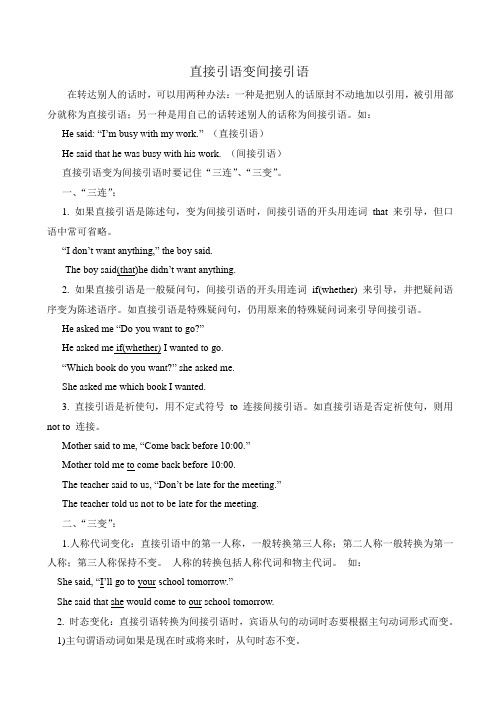
直接引语变间接引语在转达别人的话时,可以用两种办法:一种是把别人的话原封不动地加以引用,被引用部分就称为直接引语;另一种是用自己的话转述别人的话称为间接引语。
如:He said: “I’m busy with my work.” (直接引语)He said that he was busy with his work. (间接引语)直接引语变为间接引语时要记住“三连”、“三变”。
一、“三连”:1. 如果直接引语是陈述句,变为间接引语时,间接引语的开头用连词that 来引导,但口语中常可省略。
“I don’t want anything,” the boy said.The boy said(that)he didn’t want anything.2. 如果直接引语是一般疑问句,间接引语的开头用连词if(whether) 来引导,并把疑问语序变为陈述语序。
如直接引语是特殊疑问句,仍用原来的特殊疑问词来引导间接引语。
H e asked me “Do you want to go?”He asked me if(whether) I wanted to go.“Which book do you want?” she asked me.She asked me which book I wanted.3. 直接引语是祈使句,用不定式符号to连接间接引语。
如直接引语是否定祈使句,则用not to 连接。
M other said to me, “Come back before 10:00.”Mother told me to come back before 10:00.The teacher said to us, “Don’t be late for the meeting.”The teacher told us not to be late for the meeting.二、“三变”:1.人称代词变化:直接引语中的第一人称,一般转换第三人称;第二人称一般转换为第一人称;第三人称保持不变。
直接引语变间接引语方法小结
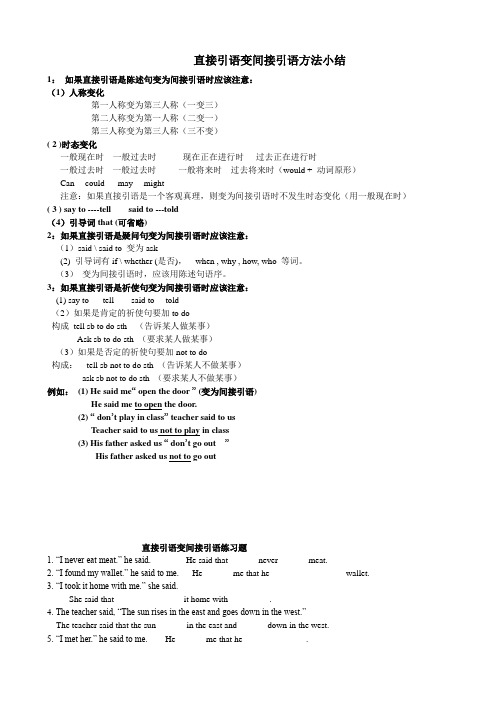
直接引语变间接引语方法小结1:如果直接引语是陈述句变为间接引语时应该注意:(1)人称变化第一人称变为第三人称(一变三)第二人称变为第一人称(二变一)第三人称变为第三人称(三不变)( 2 )时态变化一般现在时---一般过去时现在正在进行时----过去正在进行时一般过去时---一般过去时一般将来时---过去将来时(would + 动词原形)Can ---could may ---might注意:如果直接引语是一个客观真理,则变为间接引语时不发生时态变化(用一般现在时)( 3 ) say to ----tell said to ---told(4)引导词that (可省略)2:如果直接引语是疑问句变为间接引语时应该注意:(1)said \ said to 变为ask(2) 引导词有if \ whether (是否),when , why , how, who 等词。
(3)变为间接引语时,应该用陈述句语序。
3:如果直接引语是祈使句变为间接引语时应该注意:(1) say to ----tell said to ---told(2)如果是肯定的祈使句要加to do构成tell sb to do sth (告诉某人做某事)Ask sb to do sth (要求某人做某事)(3)如果是否定的祈使句要加not to do构成:tell sb not to do sth (告诉某人不做某事)ask sb not to do sth (要求某人不做某事)例如:(1) He said me“ open the door ” (变为间接引语)He said me to open the door.(2) “ don’t play in class” teacher said to usTeacher said to us not to play in class(3) His father asked us “ don’t go out ”His father asked us not to go out直接引语变间接引语练习题1. “I never eat meat.” he said. He said that ______ never ______ meat.2. “I found my wallet.” he said to me. He ______ me that he ______ ______ wallet.3. “I took it home with me.” she said.She said that ______ _______ it home with _________.4. The teacher said, “The sun rises in the east and goes down in the west.”The teacher said that the sun ______ in the east and ______ down in the west.5. “I met her.” he said to me.He ______ me that he ______ ______.6. “You must come here .” he sai d. He said that ______ ______ come here..7. “I bought the house 10 years ago.” he said.He said that _____ _______ bought the house 10 years ago8. “Did you see her?” he said.He ______ ______ _____ had seen her9. He said, “You can sit here, Jim.”He ______ Jim that_____ ______ sit there10. He asked, “How did you find it, mother?”He asked her mother ______ ______ ______ it.11. “Where have you been” he asked.He asked me _______ _______ _______been.12. “Do you know where she lives?” he asked.He asked ______ ______ knew where she ______.13. “Stop making so much noise, children.” he said.He ______ the children ______ ______ making so much noise.14. “Don’t tell him the news.” she said.She told me _______ ______ ______ him the news.15. “Are you interested in this book ?” he said.He ______ ______ I was interested in that book16.He said: “I’ve left my book in my room.”He said _____ _______ left ______book in _______room17.She sai d: “He will be busy.”She said _____ _____be busy18.She said to Tom, “Can you help me?”She said to Tom _____ _____ ______help _______19.She asked, “are you interested in this book ?”She asked _______ _____ _____ interested in that book20.The teacher asked, “how did you repair it?”The teacher asked ________ _______ ________ it .21.The teacher said to the students, “Don’t waste your timeThe teacher ________the students ________ ______ waster _________ time。
直接引语变间接引语的用法

直接引语变间接引语的用法由直接引语变为间接引语,分以下情况:1、直接引语是陈述句时间接引语为that引导的宾语从句(口语中that可以省略),主句的引述动词主要有say ,tell, repeat, explain, think等。
He said, "You are younger than I.” He said (that) I was younger than him.2、直接引语是疑问句时间接引语为陈述语序:主句的谓语动词say 改为ask,或改为wonder, do not know, want to know, be not sure, be puzzled等。
(1)一般疑问句或反意疑问句变为if (whether)引导的宾语从句。
She said, "Do you often come here to read newspapers?"→She asked me if (或whether)I often went there to read newspapers.She asked me, "You have seen the film, haven’t you?"→She asked me whether(或if )I had seen the film.(2)选择疑问句变为whether….or 宾语从句。
I asked him, "Will you stay at home or go to a film tonight?"→I asked him whether he would stay at home or go to a film that night.(3)特殊疑问句变为由原来的疑问词引导的宾语从句。
He asked, "Where do you live?" →He asked me where I lived.3、直接引语是祈使句时间接引语为不定式,作ask , tell, beg, order, warn, advise等动词的宾语补足语(don’t 变为not ).The teacher said to the boy, "Open the window." →The teacher told the boy to open the window. His father said to him, “Don’t leave the door open.” →His father told him not to leave the door open.[注意](1)有些表示建议、提议、劝告或要求的祈使句,可以用suggest ,insist等动词加以转述。
英语中直接引语变为间接引语的规则

英语中直接引语变为间接引语的规则在英语语法中,直接引语和间接引语之间的相互转换是个重点也是个难点。
但是在初中英语考试中,通常考查直接引语变为间接引语。
因此,我将这个语法知识点整理如下:一,四种类型1,直接引语为陈述句,变为间接引语时用that 引导,that 也可以省略。
2,直接引语为一般疑问句,变为间接引语时用if 或whether 引导,间接引语部分要用陈述句语序。
3,直接引语为特殊疑问句,变为间接引语时用原来的疑问词引导,间接引语部分要用陈述语序。
4,直接引语为祈使句,变为间接引语时要变为由动词不定式短语构成的复合结构。
二,三大变化1,人称的变化:直接引语变间接引语时,人称的变化遵循“一主,二宾,三不变”的原则。
“一主”指第一人称应改为与主句主语一致的人称;“二宾”指第二人称应改为与主句宾语一致的人称;“三不变”指第三人称保持不变。
2,时态的变化:直接引语变间接引语时,如果主句谓语动词是一般现在时或一般将来时,间接引语的时态通常不变;若主句谓语动词是一般过去时,间接引语常变成相应的过去时态。
即:一般现在时变为一般过去时;现在进行时变为过去进行时;一般将来时变为过去将来时;一般过去时变为过去完成时;若转述的内容为客观真理,时态则不变。
3,根据需要的其他变化:指示代词有this变为that,these变为those 等;时间状语有today变为that day,yesterday变为the day before,tomorrow变为the next / following day,the day after tomorrow 变为two days later / in two days' time 等;地点状语有here 变为there 等;动词有come 变为go 等。
高考英语专题之祈使句的直接引语变间接引语

高考英语专题之祈使句的干脆引语变间接引语一、教学内容祈使句的干脆引语变间接引语二、学问精讲(一)视察下列句子,试着总结、思索祈使句的干脆引语变间接引语的规律。
1. “Make sure the door is shut,” she said to her little son.She told her little son to make sure the door was shut.2. “Don’t smoke in the room,” he said to me.He told me not to smoke in the room.3. Mrs. Hill said, “ please sing at our party, Mary.”Mrs. Hill asked Mary to sing at their party.4. He said to the girl, “Do it at once.”He told the girl to do it at once.总结:祈使句的干脆引语变为间接引语的规律1. 一改:主句谓语动词干脆引语为祈使句,变为间接引语时,谓语动词said/said to常改成ask, advise, tell, warn, order, request等。
2. 二变:呼语变宾语3. 三加:动词前加to4. 四去:please(二)祈使句变为间接引语后,就成了以不定式短语形式出现的宾语补足语,其结构通常为:ask/ advise/ tell/warn/order/ request sb. (not ) to do sth.例:He said,“Be seated, please. ” →He asked us to be seated.She said to me, “Don’t smoke in the classroom.”→She told me not to smoke in the classroom.即学即用:Mary asked me _____ to answer that letter.A. don’t forgetB. not forgetC. not to forgetD. not forgetting答案:C▲留意:1. 有些含有“建议”、“劝说”的祈使句,可用suggest, insist, offer等动词转述。
祈使句的直接引语和间接引语
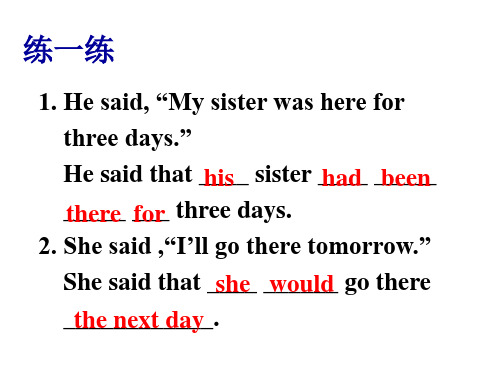
that 引导的宾语从句 I suggested to him that we (should) start at once.
直接引语 (变化前) 间接引语(变化后)
感叹句
that/what/how引导
He said: “How 的宾语从句
happy I am!”
He said that he was
Reqd I use your bathroom? request
2. Put your coat in the closet. command
3. Speak quietly on the phone, please.
request
4. Will you help me with my homework this afternoon?
把直接引语转换为间接引语。
1. “Could you pass me the salt?” Mary said to me.
→ Mary asked me to pass her the salt. 2. “Show me your license, please.” the
policeman said to the driver. → The policeman told the driver to show
request 5. Could you meet me at four?
(完整版)英语语法如何把直接引语转换为间接引语
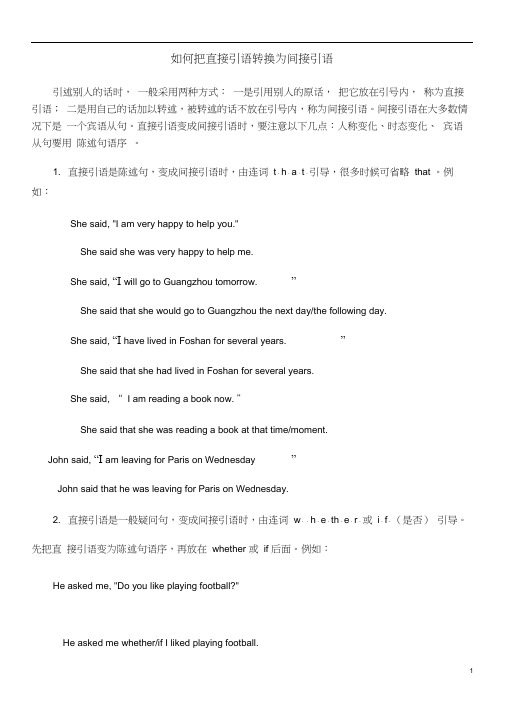
如何把直接引语转换为间接引语引述别人的话时,一般采用两种方式:一是引用别人的原话,把它放在引号内,称为直接引语;二是用自己的话加以转述,被转述的话不放在引号内,称为间接引语。
间接引语在大多数情况下是一个宾语从句。
直接引语变成间接引语时,要注意以下几点:人称变化、时态变化、宾语从句要用陈述句语序。
1. 直接引语是陈述句,变成间接引语时,由连词t.h.a.t.引导,很多时候可省略that 。
例如:She said, "I am very happy to help you."She said she was very happy to help me.She said, “I will go to Guangzhou tomorrow. ”She said that she would go to Guangzhou the next day/the following day.She said, “I have lived in Foshan for several years. ”She said that she had lived in Foshan for several years.She said, “ I am reading a book now. ”She said that she was reading a book at that time/moment.John said, “I am leaving for Paris on Wednesday ”John said that he was leaving for Paris on Wednesday.2. 直接引语是一般疑问句,变成间接引语时,由连词w..h.e.th.e.r.或i.f.(是否)引导。
先把直接引语变为陈述句语序,再放在whether 或if 后面。
例如:He asked me, "Do you like playing football?"He asked me whether/if I liked playing football.He asked Mary, “Will you come to my birthday party?You will come to my birthday party.He asked Mary whether/if she would come to his birthday party.注意:大多数情况下,if 和whether 可以互换,但后有or not, 或在动词不定式前,或放在介词后作连接词时,一般只用whether 。
祈使句的直接引语变间接引语讲解
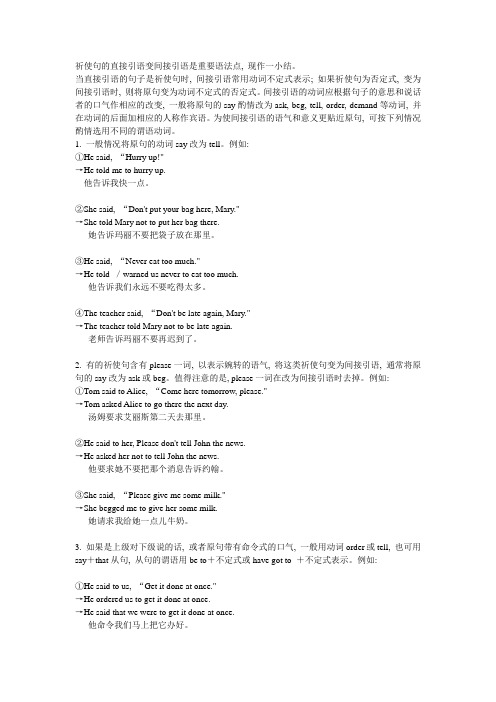
祈使句的直接引语变间接引语是重要语法点, 现作一小结。
当直接引语的句子是祈使句时, 间接引语常用动词不定式表示; 如果祈使句为否定式, 变为间接引语时, 则将原句变为动词不定式的否定式。
间接引语的动词应根据句子的意思和说话者的口气作相应的改变, 一般将原句的say酌情改为ask, beg, tell, order, demand等动词, 并在动词的后面加相应的人称作宾语。
为使间接引语的语气和意义更贴近原句, 可按下列情况酌情选用不同的谓语动词。
1. 一般情况将原句的动词say改为tell。
例如:①He said, “Hurry up!"→He told me to hurry up.他告诉我快一点。
②She said, “Don't put your bag here, Mary."→She told Mary not to put her bag there.她告诉玛丽不要把袋子放在那里。
③He said, “Never eat too much."→He told /warned us never to eat too much.他告诉我们永远不要吃得太多。
④The teacher said, “Don't be late again, Mary."→The teacher told Mary not to be late again.老师告诉玛丽不要再迟到了。
2. 有的祈使句含有please一词, 以表示婉转的语气, 将这类祈使句变为间接引语, 通常将原句的say改为ask或beg。
值得注意的是, please一词在改为间接引语时去掉。
例如:①Tom said to Alice, “Come here tomorrow, please."→Tom asked Alice to go there the next day.汤姆要求艾丽斯第二天去那里。
直接引语变间接引语口诀

直接引语变间接引语口诀一、当直接引语为陈述句,变成间接引语的“顺口溜”是:去掉引号加that,人称变化要灵活,时态向后退一步,状语变化按规则。
She said,“My brother doesn't want to go there.”→She said that her brother didn't want to go there.二、当直接引语为一般疑问句,变成间接引语的“顺口溜”是:去掉引号加if,陈述语序要记住,时态人称和状语,小心变化别马虎。
I asked her,“Do you study English here?”→I asked her if she studied English there.三、当直接引语是特殊疑问句,变成间接引语的“顺口溜”是:直接去引号,陈述莫忘掉,小心助动词,丢它最重要。
“What do you want?”he asked me. →He asked me what I wanted.四、当直接引语是祈使句,变成间接引语的“顺口溜”是:去掉引号要加to, ask,tell须记住,直引若是否定式,not加在to前部。
The teacher said to her mother,“Please give me the book.” →The teacher told her mother to give her the book.五、对于人称变化,要求学生们记住的“顺口溜”是:第一人称看主语,第二人称看宾语,宾语若是不存在,活用代词I,my,me。
He said to her,“Are you interested in English?”→He a sked her if she was interested in English.The teacher said,“Where have you been?”→The teacher asked me(us) where I(we) had been.六、时态对应表:直接引语时态间接引语时态一般现在时→ 一般过去时一般将来时→ 过去将来时现在进行时→ 过去进行时一般过去时→ 过去完成时现在完成时→ 过去完成时(过去完成时时态不变)情态动词也要变成相应的过去式:can could; may might; must must/had to一般疑问句whether/if 引导的宾语从句“Is this your umbrella, Mary?” asked John.John asked Mary if that was her umbrella.特殊疑问句wh-词引导的宾语从句“Mary, when will you return John asked Mary when she wouldme the book?” asked John return him the book主句动词为一般现在时或现在完成时从句动词时态不变She often says, “All men and women She often says that all men and womenar e equal under the law.”are equal under the law.主句动词为一般过去时一般现在时一般过去时“I know it,” he said.He said that he knew it现在进行时过去进行时“I’m making coffee for you all,” she said.She said she was making coffee for us all.现在完成时过去完成时“I have seen her before,” said he. He said he had seen her before.一般过去时过去完成时“I saw her last Monday,” he said.He said he had seen her the previous Monday过去完成时过去完成时“ Do you know Rick had been ill in bed.Jack asked if I knew Rick had been ill in bedfor many days till he died?” Jack asked for many days till he died一般将来时过去将来时He said: “We shall start tomorrow He said they would start the next day由直接引语转变为间接引语,下列情况时态不变:1. 不变的真理The teacher said to the students, “Water freezes when the temperature falls below 0℃.”→ The teacher told the students that water freezes when the temperature falls below 0℃.2. 经常的习惯:He said to the doctor, “I smoke two packs every day.”→ He told the doctor that he smokes two packs every day.3. 历史事件:The teacher said, “World War Ⅱended in 1945.”→ The teacher said that World War Ⅱ ended in 1945.4. 部分情态动词,如must, ought to, used to, had better等:She said to me: “You must hurry up.”→ She said that I must hurry up.练习题;1. Jack said to me, “You look worried today.”Jack told me that ___ worried ___.A. he looks…todayB. you look…todayC. we looked…that dayD. I looked…that day2. We said to her, “They’re walking through the street now.”We told her that ___ through the street ___.A. we were walking…thenB. you are walking…nowC .they were walking…then D. they walking…now3. Mr Black said, “I have walked a long way this week.”Mr Black said that __ a long way __.A. I had walked…last wee kB. he had walked…that weekC. I walked…last weekD. he has walked…this week4. The man thought, “I shall take it back tomorrow.”The man thought that __ take it back ____.A. I shall…tomorrowB. I shall…the next dayC. he should…tomo rrowD. he wo uld …the next day5. They said to us, “Are you afraid to leave this house ?”They asked us ____ afraid to leave _____ house.A. that were we…thisB. that we were…thatC. if were we …thisD. if we were…that6. Jane said, “What did he hear about a week ago?”Jane asked ____ about _____.A. that he heard…a week ag oB. what he had heard…the week beforeC. what he had herd… a week agoD. if he heard…the week ago7. She asked, “Whose house will he break into next time ?”She asked whose house ____ break into __A. will he…next timeB. would he…the next timeC. he would…the next timeD. he will…next time8. Jack said to her, “Where do you spend your holidays?”Jack asked her where ____ holidays.A. she spent herB. you spend yourC. she spend herD. you spent your9. Black asked me, “ Why haven’t you left here yet?”Black asked me why ____ yet.A. I hadn’t left thereB. I haven’t left hereC. hadn’t I left thereD. haven’t I lef t here10. The teacher asked her, “Does the sun rise in the east ?”The teacher asked her ___ the sun ___ in the east.A. if…riseB. if…risesC. whether…roseD. whether did …rise。
直接引语变间接引语常用的有三种情况
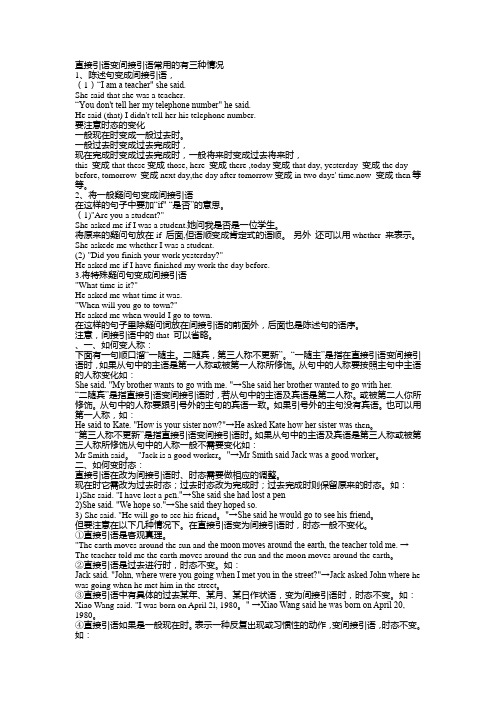
直接引语变间接引语常用的有三种情况1、陈述句变成间接引语,(1)“I am a teacher" she said.She said that she was a teacher.“You don't tell her my telephone number" he said.He said (that) I didn't tell her his telephone number.要注意时态的变化一般现在时变成一般过去时。
一般过去时变成过去完成时,现在完成时变成过去完成时,一般将来时变成过去将来时,this 变成that these变成those, here 变成there ,today变成that day, yesterday 变成the day before, tomorrow 变成next day,the day after tomorrow变成in two days' time.now 变成then 等等。
2、将一般疑问句变成间接引语在这样的句子中要加“if" “是否”的意思。
(1)"Are you a student?"She asked me if I was a student.她问我是否是一位学生。
将原来的疑问句放在if 后面,但语顺变成肯定式的语顺。
另外还可以用whether 来表示。
She askede me whether I was a student.(2) "Did you finish your work yesterday?"He asked me if I have finished my work the day before.3.将特殊疑问句变成间接引语"What time is it?"He asked me what time it was."When will you go to town?"He asked me when would I go to town.在这样的句子里除疑问词放在间接引语的前面外,后面也是陈述句的语序。
祈使句变间接引语

Homework
1. Preview Page 12-13 2.Finish off “优化方案” Page 30-40 “课时作业” Page 111-112
3.警告,提醒
warn sb (not) to do remind sb(not) to do
1.“Don't somke!” the teacher said. The teacher warned the students not to smoke. 2.“ Take the umbrlla in case of rain.” his mother said to her. Her mother warned/reminded her to take the umbrella in case of rain.
tell sb (not) to do sth
The techer said to her class,“Please have a seat.” The teacher asked her class to have a seat.
ask (not) sb to do sth
The manager said to the clerk, “Copy the document.”
The man asked his son not to plau computer games any longer.
.
5. “How fast she runs!” she said to her sister.(tell to do) She told to her sister that how fast she run.
1. 表示命令,ask /tell /order sb (not) to do sth
祈使句间接引语

如何把直接引语里的祈使句 转换成间接引语?
祈使句由直接引语变间接引语方法是: 使用ask(tell,order)sb. to do sth. 这一结构进行转换,若祈使句为否定式, 则用ask(tell,order)sb. not to do sth. ------------------------------------------------------------------------①直接引语是表示请求的,带有“please”的句子, 间接引语里的动词应换成“ask”。 例如:“Please save my son, doctor.” the mother Please said to the doctor. → The mother asked the doctor to save her son.
The headteacher ordered us to be quiet.
五、将下列句子译成英语 1.老师要求我们不要弄出那么多声音。 The teacher asked us not to make so much noise. ___________________________________ 2.妈妈告诉我在学校要听从老师的吩咐。 Mom told me to follow my teachers’ instuctions at school. ___________________________________ 3. 要求来访者勿踏草地。 Visitors are requested not to walk on the grass. ___________________________________ 4.不止一所学校正在使用这套教材。 ___________________________________ More than one school is using this set of textbooks.
祈使句的直接引语变间接引语

祈使句的直接引语变间接引语例如:hall."Go away.” Fhe officer ordered us to go away.注意:当祈使句的直接引语变为间接引语时,因为祈使句表⽰“请求”、“命令”等⼝⽓,所以祈使句直接引语变为间接引语时不存在时态的变化。
但是⼈称、指⽰代词、时间、地点状语等的变化还应根据陈述句直接引语变间接引语的⽅法进⾏相应的改变。
例如:doctors asked Dr. Bethune to let him go on with the op eration."Go and wash your face, Tom, ” Mother said. TMother told Tom to go and wash his face.顺便提⼀下,祈使句的间接引语变直接引语也应该遵循陈述句间接引语变直接引语的⽅法。
例如: "Giveit to me, pl ease,” Wei Fang said to him.只要同学们认真记住以上三种祈使句直接引语变间接引语的基本结构,相信同学们⼀定能学会祈使句的直接引语变间接引语。
⼩试⽜⼑:A )变下列直接引语为间接引语。
祈使句的直接引语变间接引语在第⼀单元中我们学习了陈述句和疑问句的直接引语变间接引语的⽤法,本期主要讲解祈使句的直接引语变间接引语的⽤法。
先看两个句⼦: 1. “Put your coat in the closet, put his coat in the closet. ” the landlord said to him. The landlord asked him to move. 2. The father said to his children, Don't move! ”T The father t old his children not to 从以上两个句⼦可以看出:例句 1是表⽰“请求”的⼝⽓;例句 2是表⽰“命令”的⼝⽓。
直接引语变间接引语及其注意事项

引述别人的话时,一般采用两种方式:一是引用别人的原话,把它放在引号内,称为直接引语;二是用自己的话加以转述,被转述的话不放在引号内,称为间接引语。
间接引语在大多数情况下是一个宾语从语。
直接引语变成间接引语时,要注意以下几点:人称变化、时态变化、宾语从句要用陈述句语序。
1.直接引语是陈述句,变成间接引语时,由连词that 引导。
例如:She said, "I am very happy to help you."→She said that she was very happy to help you.2. 直接引语是一般(选择/反意)疑问句,变成间接引语时,由连词whether或if 引导。
例如:He asked me, "Do you like playing football?"→He asked me if/whether I liked playing football.注意:大多数情况下,if和whether 可以互换,但后有or not,或在动词不定式前,或放在介词后作连接词时,一般只用whether。
例如:She asked me whether he could do it or not.He hesitated about whether to drive or take the train.3. 直接引语是特殊疑问句,变成间接引语时,由相应的疑问词who, whom, whose, how, when, why, where 等引导。
例如:My sister asked me, "How do you like the film?"→My sister asked me how I liked the film.4. 直接引语是祈使句,变成间接引语时,把动词原形变成动词不定式,并在动词不定前加tell, ask, order 等的宾语。
语法讲解--祈使句变间接引语
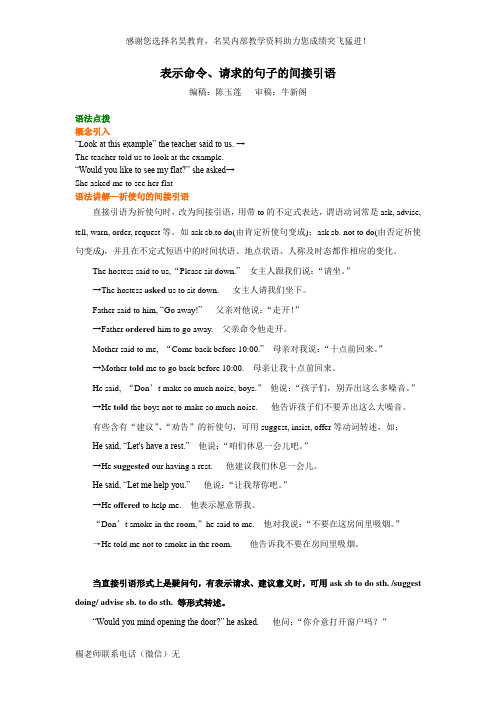
表示命令、请求的句子的间接引语编稿:陈玉莲审稿:牛新阁语法点拨概念引入“L ook at this example” the teacher said to us. →The teacher told us to look at the example.“Would you like to see my flat?” she asked→She asked me to see her flat语法讲解—祈使句的间接引语直接引语为祈使句时,改为间接引语,用带to的不定式表达,谓语动词常是ask, advise, tell, warn, order, request等。
如ask sb.to do(由肯定祈使句变成);ask sb. not to do(由否定祈使句变成),并且在不定式短语中的时间状语、地点状语、人称及时态都作相应的变化。
The hostess said to us,“Please sit down.”女主人跟我们说:“请坐。
”→The hostess asked us to sit down. 女主人请我们坐下。
Father said to him, “Go away!”父亲对他说:“走开!”→Father ordered him to go away. 父亲命令他走开。
Mother said to me, “Come back before 10:00.”母亲对我说:“十点前回来。
”→Mother told me to go back before 10:00. 母亲让我十点前回来。
He said, “Don’t make so much noise, boys.”他说:“孩子们,别弄出这么多噪音。
”→He told the boys not to make so much noise. 他告诉孩子们不要弄出这么大噪音。
有些含有“建议”、“劝告”的祈使句,可用suggest, insist, offer等动词转述,如:He said, “Let's have a rest.” 他说:“咱们休息一会儿吧。
- 1、下载文档前请自行甄别文档内容的完整性,平台不提供额外的编辑、内容补充、找答案等附加服务。
- 2、"仅部分预览"的文档,不可在线预览部分如存在完整性等问题,可反馈申请退款(可完整预览的文档不适用该条件!)。
- 3、如文档侵犯您的权益,请联系客服反馈,我们会尽快为您处理(人工客服工作时间:9:00-18:30)。
祈使句的直接引语变间接引语在第一单元中我们学习了陈述句和疑问句的直接引语变间接引语的用法,本期主要讲解祈使句的直接引语变间接引语的用法。
先看两个句子:1. “Put your coat in the closet,”the landlord said to him.→ The landlord asked him to put his coat in the closet.2. The father said to his children,“Don't move!”→The father t old his children not to move.从以上两个句子可以看出:例句1是表示“请求”的口气;例句2是表示“命令”的口气。
由此看来,当我们转述祈使句时,通常将原句中的动词变为动词不定式,并在不定式的前面加上ask, order, tell等转述动词,形成三种结构:①表示邀请、请求某人做某事时用ask sb. to do sth.; ②表示叫、吩咐某人做某事时用tell sb. to do sth.; ③表示命令某人做某事时用order sb. (not) to do sth.。
例如:①She said to us, “Please have a rest.” →She asked us to have a rest.②The old man said, “Don't smoke in the hall.”→The old man told me not to smoke in the hall.③The officer said, “Go away.” →The officer ordered us to go away.注意:当祈使句的直接引语变为间接引语时,因为祈使句表示“请求”、“命令”等口气,所以祈使句直接引语变为间接引语时不存在时态的变化。
但是人称、指示代词、时间、地点状语等的变化还应根据陈述句直接引语变间接引语的方法进行相应的改变。
例如:One of the doctors said, “Let me go on with the operation, Dr. Bethune.”→ One of the doctors asked Dr. Bethune to let him go on with the operation.不知道同学们注意到没有,该句直接引语中有个称呼语Dr. Bethune,一般把它当作宾语用。
再如:“Go and wash your face, Tom,” Mother said.→Mother told Tom to go and wash his face.顺便提一下,祈使句的间接引语变直接引语也应该遵循陈述句间接引语变直接引语的方法。
例如:Wei Fang asked him to give it to her. →“Give it to me, please,” Wei Fang said to him.只要同学们认真记住以上三种祈使句直接引语变间接引语的基本结构,相信同学们一定能学会祈使句的直接引语变间接引语。
小试牛刀:A)变下列直接引语为间接引语。
1.“Stop talking!”the monitor said to the class.________________________________________________________________________2. “Repeat it three times,” the teacher said to her.________________________________________________________________________3. “Will you buy some bread for me?” he said to her.________________________________________________________________________4.“Don't take off your coat,” she said to her sister.________________________________________________________________________5. “Stay here!” the officer said to the soldier.________________________________________________________________________B)填空完成间接引语,每空一词。
6. “Don't forget to give the message to my wife,” he said to Li Ping.He _______ Li Ping _______ _______ forget to give the message to _______ wife.7. “Mum, please help me find my shirt,” he said.He _______ his mother _______ help _______ find _______ shirt.8. “Use your knife to cut the boots open,” the officer said to the guard.The officer _______ the guard _______ _______ _______ knife to cut the boots open.9. “Don't spend too much time on football!” Mother said to me.Mother _______ me _______ _______ _______ too much time on football.10. “Will you sleep and get up early, children?” Father said.Father _______ the children _______ _______ and _______ up early.C)单项选择。
11. “Don't worry about me,” she _______ her sister.A. said toB. referred toC. thanked toD. spoke12. “ _______help me with my English?”she said.A. Shall weB. Do youC. Could youD. Might you13. She told me _______ a noise in the hall.A. don't makeB. not to makeC. make not toD. to make not14. Martin _______ his dog to lie down under the big tree.A. madeB. hadC. promisedD. ordered15. His father asked the boy, “ _______are doing this for?”A. What; youB. Which; youC. Where; weD. Why; weKey:A) 1. The monitor told the class to stop talking. 2. The teacher asked her to repeat it three times. 3. He asked her to buy some bread for him. 4. She asked her sister not to take off her coat. 5. The officer ordered the soldier to stay there.B) 6. told; not to; his 7. asked; to; him; his 8. ordered; to use his 9. told; not to spend 10. asked; to sleep; getC)11—15 ACBDADIRECT SPEECH AND INDIRECT SPEECH直接引语与间接引语(1)引述别人的原话称为直接引语,用自己的话转述别人的话,称为间接引语。
它们都是复合句中的宾语从句。
直接引语要放在引号内,不用连词连接;间接引语不用引号,通常用连词连接于主句。
转换时应注意:A.引用的原话是陈述句,改为间接引语时,通常用连词that引导宾语从句,还要根据意思适当改变人称,时态以及时间状语,地点状语等。
当主语的谓语动词是现在时,宾语从句中的动词时态不变;当主句的谓语动词是过去时态时,则宾语从句中的动词时态应作相应的改变。
时态的改变(2)引述的是疑问句时,变为间接引语时,一般疑问句用whether 或if来引导,选择疑问句只能用whether,特殊疑问句用原来的疑问词。
不论一般或特殊疑问句,变间接引语时,通常按原陈述句的语序,即把动词放在主语的后面。
“Are you feeling better today?” the doctor asked my sister.The doctor asked my sister if she was feeling better that day?“Is this book yours or his?” She asked me.She asked me whether that book was mine or his.(只能用whether)He asked me ,“Why didn’t you come here yesterday?”He asked me why I hadn’t gone there the day before.(3)引用的原句如果是祈使句,变为间接引语时,句字的谓语动词要用含有祈使意义的动词如tell, ask, order(命令)。
引语的动词要改为不定式。
如果祈使句是否定形式,在动词不定式前加not.He said to me,“Tell me something about the film.”He asked me to tell him something about the film.The teacher said to the students,“Don’t open your books.”The teacher told the students not to open their books.Exercises1.Paul said,“It is high time we left the place.”2.He said,“If what you said is true I must go to the police.”3.He said,“A fter the lecture I had to rush home.”4.Mary said,“When I saw them last they were listening to the recording.”5.“I am starting the work the day after tomorrow,” Mike said.6.1.1)当直接引语是陈述句时,间接引语通常用that引导,that也可以省略。
